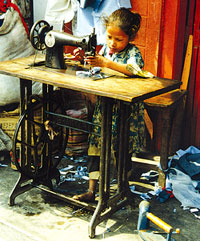 Ten years of conflict have dumped loads of distress and destruction onto this country but also revealed some positive findings about Nepali society. One is that, deprived of their men and forced to manage their families' affairs, women are far more resilient and resourceful than most people ever gave them credit for. Another is that even faced with imminent danger to their most precious assets, their children, parents plan carefully before they rush their offspring to safety.
Ten years of conflict have dumped loads of distress and destruction onto this country but also revealed some positive findings about Nepali society. One is that, deprived of their men and forced to manage their families' affairs, women are far more resilient and resourceful than most people ever gave them credit for. Another is that even faced with imminent danger to their most precious assets, their children, parents plan carefully before they rush their offspring to safety.
The latter was one finding of a recent field study about children forced to flee the conflict in villages to work in Nepal's towns and cities. 'Family and village networks supported the children well during migration. Exploitative labour agents and traffickers were not reported,' says Asylums of Exploitation, published by Nepal-based INGO Terre des Hommes Foundation supported by Save the Children Alliance and based on research conducted by the Centre for Research on Environment, Health and Population Activities (CREHPA).
"Maoists would visit houses three times. They would threaten the parents-give us Rs 50,000 or your child. After the second visit, the children migrated," explained Moni Shrestha and Laxmi Shrestha, field coordinators for the research study from CREHPA. "Parents are very alert. When they know the Maoists are attacking a neighbouring village, they send their children to the city," the coordinators told us.
The study also contradicts the assumption that families, in their fear and desperation due to the conflict, are careless in placing their children in labour situations. But that does not make the work done by the children any less exploitative. 'The level of verbal and corporal punishment of labouring children was much higher than expected. As well, the amount of social discrimination against labouring children was extreme, and was noted by many children,' says the report. Researchers interviewed 413 internally displaced children (267 boys and 146 girls) ages 10-17 in Kathmandu, Pokhara and Biratnagar. Of the 141 in the capital, the largest number, 50, worked in carpet factories. In Pokhara, 40 out of 138 were domestics and in Biratnagar 41 of the 134 children interviewed worked in restaurants.
On average, girls worked 11 hours a day and boys nine. Despite this, most described their working situations as good or average. All-except for street children-were eating regularly, almost all children had access to medicine but not necessarily health care and one-fifth of boys and three-fifths of girls were taking classes, either formally or informally.
One-half of girls and one-quarter of boys were sending money to their families but many children, particularly domestic workers and mechanics helpers were unpaid. Many of those children had been targeted by Maoists (rather than leaving for indirect reasons like their school shutting down) and their parents simply wanted to send them somewhere safe as fast as possible, said Moni Shrestha.
Some employers took advantage of that desperation, said Laxmi Shrestha. One girl told researchers: "I have to get up at 3AM, otherwise they pour a pan of water on me. The employer's children also discriminate against me, saying, 'You are a servant! Get away from me'. My employer's wife teaches her children to talk like this."
The study notes that children who have made contact with NGOs are far more likely to seek help dealing with exploitative workplaces but also criticises NGOs for not putting more effort into finding and helping conflict displaced children.
The study found no reason to conclude that displaced children are treated worse overall than other working kids but its findings reinforce the need for society to work harder to end exploitative labour.
Recommendations
Central government should: relax school enrolment rules so IDP children without documentation can study
Municipalities should: provide basic health care services and access to education
NGOs should: shift emphasis from drop-in centres and shelters to mobile outreach
Families employing children should: finance their education and health care and link them with supporting organisations
Employers should: receive training on supporting and protecting working children, existing laws and child rights and make necessary changes to provide these


